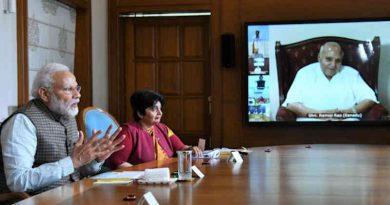Green Recovery Can Bring Stronger Economic Growth: Report

The Global Recovery Observatory is an initiative led by the Oxford University Economic Recovery Project (OUERP).
One year from the onset of the pandemic, recovery spending has fallen short of nations’ commitments to build back more sustainably. An analysis of spending by leading economies, led by Oxford’s Economic Recovery Project and the UN Environment Programme (UNEP), finds only 18.0% of announced recovery spending can be considered ‘green.’
The report, Are We Building Back Better? Evidence from 2020 and Pathways for Inclusive Green Recovery Spending, calls for governments to invest more sustainably and tackle inequalities as they stimulate growth in the wake of the devastation wrought by the pandemic.
The most comprehensive analysis of Covid-19-related fiscal rescue and recovery efforts by 50 leading economies so far, the report reveals that only $368bn of $14.6tn Covid-induced spending (rescue and recovery) in 2020 was green.
“Humanity is facing a pandemic, an economic crisis and an ecological breakdown – we cannot afford to lose on any front. Governments have a unique chance to put their countries on sustainable trajectories that prioritize economic opportunity, poverty reduction and planetary health at once – the Observatory gives them the tools to navigate to more sustainable and inclusive recoveries,” said UNEP’s Executive Director, Inger Andersen.
The report emphasizes that green recovery can bring stronger economic growth, while helping to meet global environmental targets and addressing structural inequality. To keep decades of progress against poverty from unwinding, low-income countries will require substantial concessional finance from international partners.
On the whole, so far global green spending “has been incommensurate with the scale of ongoing environmental crises,” according to the report, including climate change, nature loss, and pollution, missing significant social and long-term economic benefits.
Key findings of the analysis in terms of recovery spending:
- $341bn or 18.0% of spending was green, mostly accounted for by a small group of high-income countries. Global recovery spending has so far missed the opportunity for green investment.
- $66.1bn was invested in low carbon energy, largely thanks to Spanish and German subsidies for renewable energy projects and hydrogen and infrastructure investments.
- $86.1bn announced for green transport through electric vehicle transfers and subsidies, investments in public transport, cycling and walking infrastructure.
- $35.2bn was announced for green building upgrades to increase energy efficiency, mostly through retrofits, notably in France and the UK.
- $56.3bn was announced for natural capital or Nature based Solutions (NbS)– ecosystem regeneration initiatives and reforestation. Two-fifths was directed towards public parks and counter pollution measures, notably in the US and China, improving quality of life and addressing environmental concerns.
- $28.9bn was announced in green R&D. Green R&D includes renewable energy technologies, technologies for decarbonising sectors such as aviation, plastics, and agriculture, and carbon sequestration. Without progress in green R&D, meeting the Paris Agreement targets would require far-reaching pricing and lifestyle changes.
The Global Recovery Observatory is an initiative led by the Oxford University Economic Recovery Project (OUERP), and supported by UNEP, the International Monetary Fund and GIZ through the Green Fiscal Policy Network (GFPN).





